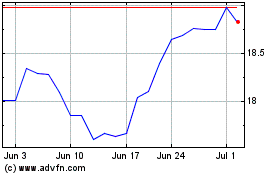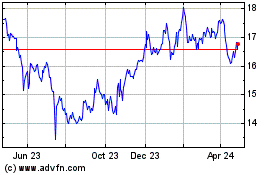Combination of AT&T, Time Warner elicits concerns,
suggesting deal will face pressure
By John D. McKinnon, Thomas Gryta and Shalini Ramachandran
The CEOs of AT&T Inc. and Time Warner Inc. on Wednesday
defended their proposed $85 billion merger to lawmakers, trying to
navigate a tricky political landscape in which President-elect
Donald Trump has expressed hostility to the deal.
Senators from both parties voiced wide-ranging concerns about
the blockbuster deal at a hearing on Capitol Hill. The companies
portrayed the union as a bulwark against the dominance of Silicon
Valley giants such as Alphabet Inc.'s Google and Facebook Inc.,
while promising new digital media services that will benefit
consumers.
Sen. Richard Blumenthal (D., Conn.) highlighted Mr. Trump's
promise to block the deal, saying, "I take him at his word," while
raising concerns that the president-elect's animus may partly be
his disapproval of cable news channel CNN and its coverage of him.
"To threaten more vigorous or adverse enforcement against a
particular company because he doesn't like the news coverage is a
threat to the First Amendment," Mr. Blumenthal said.
Mr. Trump hasn't commented on the merger since the election.
AT&T Chief Executive Randall Stephenson and Time Warner CEO
Jeff Bewkes said Wednesday they hadn't had direct communications
with the Trump administration and believed the Justice Department
would evaluate the merger fairly.
"We are anxious to put it in front of the DOJ and have the DOJ
look at the facts," Mr. Stephenson said on the sidelines of the
hearing.
Lawmakers focused their inquiries more on the complex policy
questions involved in the media business than the fraught politics.
Republican Senators shied away from Mr. Trump's hard-hitting
populist tone and his willingness to take aim at specific
businesses. Since winning the election, Mr. Trump interceded in
Carrier Corp.'s plan to move an Indiana factory to Mexico and
criticized the presumed price tag of Boeing Co.'s contract for
presidential planes .
The AT&T-Time Warner combination -- putting together the
country's largest pay-TV provider with one of biggest content
producers -- became a political lightning rod when it was announced
at the height of the presidential campaign in late October. Mr.
Trump expressed opposition before the deal was even sealed.
Messrs. Stephenson and Bewkes positioned the deal as a way to
increase competition with entrenched cable-distribution companies,
as well as the power of Google and Facebook, which dominate online
advertising and are pushing into video services.
Gene Kimmelman, a former Justice Department official and
president of public advocacy group Public Knowledge, stressed that
those internet companies rely on the wireless and broadband
networks controlled by huge telecommunications companies like
AT&T.
The deal could lead to "potential anticompetitive favoritism,"
warned Sen. Mike Lee (R., Utah), amid the grilling of the two CEOs
during a hearing that lasted about three hours. The hearing was in
front of the Senate subcommittee on antitrust, competition policy
and consumer rights.
Antitrust enforcers in the Trump administration will ultimately
decide whether to approve the deal or try to block it. However,
members of Congress can both reflect and contribute to the public
mood regarding the merger of such large, high-impact
businesses.
Cowen analyst Paul Gallant wrote in research note before the
hearing that "Congress's take on the deal could be more influential
than normal" in this deal review, given that enforcers will have to
balance Mr. Trump's unusual opposition with Republicans' typically
more hands-off approach.
Shares of Time Warner, which have been trading at a sharp
discount to AT&T's $107.50 per-share offer amid Wall Street
skepticism, closed Wednesday up 8 cents at $93.98 while AT&T
rose $1.10, or 2.8%, to $40.45.
The merger's antitrust review is taking place against the
backdrop of an election marked by populist surges in both parties,
empowering Mr. Trump and, for a time in the Democratic primaries,
Sen. Bernie Sanders of Vermont.
That dynamic was noted Wednesday. The November election was an
"outrage moment" for people who are "sick of getting pushed
around," said Sen. Amy Klobuchar (D., Minn.), the top Democrat on
the subcommittee, following the hearing. "We need to respond to
that."
But it isn't clear this populist sentiment will have a direct
impact on lawmakers' actions, especially Republicans who are
traditionally pro-business. At the hearing, GOP senators like Jeff
Flake of Arizona, Thom Tillis of North Carolina and David Perdue of
Georgia spoke positively about the deal.
Several lawmakers on both right and left appeared uncomfortable
with aspects of the deal. But they focused on well-established
antitrust principles, such as whether a so-called vertical merger
-- combining two companies that don't compete head-to-head -- would
unduly reduce competition, rather than on the broad perils of
concentrated power.
Mr. Lee, the subcommittee's chairman, said the merger could lead
to price and access problems for competitors seeking Time Warner's
prized content, such as HBO. The senator has previously expressed
skepticism of other deals ranging from Comcast Corp.'s failed
attempt to buy Time Warner Cable and AT&T's nearly $50 billion
acquisition of DirecTV last year.
The Republican also voiced concern about AT&T's practice of
zero-rating -- or exempting from data charges -- its new DirecTV
streaming video service. Critics worry that the practice could turn
AT&T into a powerful gatekeeper for consumers' content, he
noted.
The deal would combine AT&T's pay-TV subscribers and
wireless customers with one of the nation's most prized media
content companies. Time Warner owns HBO as well as the Warner Bros.
studios, plus cable networks including CNN and TNT.
Sen. Charles Grassley (R., Iowa) also noted questions about the
merged company's ability to employ "'bullying' tactics to dictate
rates and terms to other networks." Mr. Grassley cited "concern
that this acquisition will concentrate too much power into one
conglomerate," as well as "concern about the merger's implications
for a free and diverse press."
The comment echoed remarks from Mr. Trump in October that the
deal puts "too much concentration of power in the hands of too
few."
Write to John D. McKinnon at john.mckinnon@wsj.com, Thomas Gryta
at thomas.gryta@wsj.com and Shalini Ramachandran at
shalini.ramachandran@wsj.com
(END) Dow Jones Newswires
December 08, 2016 02:47 ET (07:47 GMT)
Copyright (c) 2016 Dow Jones & Company, Inc.
AT&T (NYSE:T)
Historical Stock Chart
From Mar 2024 to Apr 2024

AT&T (NYSE:T)
Historical Stock Chart
From Apr 2023 to Apr 2024
